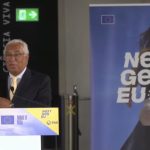Perception or reality? Just how corrupt are Portugal’s public institutions?
With several often colourful high profile police operations investigating corruption in recent years making international headlines, the idea that Portugal is a corrupt country where politicians and company executives bend the law to suit outcomes is completely wrong says Paulo de Sá e Cunha, President of the Advisory Board of the Portuguese Lawyers Association who addressed the International Club of Portugal (ICPT) in March. So is there a conflict between politics and justice and does that undermine the State of Law?
Text: Chris Graeme Photos: ICPT
Operation Influencer (*1), Operation Maestro (*3) and Operation Zarco (*2) are just three of the latest in a long string of alleged corruption cases in Portugal currently being investigated by the country’s judicial police Polícia Judiciária at the behest of the Public Ministry.
According to statistics from the General Department of Justice Policy, between 2007 and 2015, the Judiciary Police had, on average, begun 378 new investigations into alleged corruption cases per year. By 2022 that figure stood at 119 – a considerable drop.
The last decade has been marked by high-profile corruption cases that have involved prominent individuals such as a former prime-minister, a former minister of the Interior, an appellate court judge and several bankers.
In the case of the most expensive and famous, Operation Marques – an extremely media circus driven and high profile corruption case involving former prime minister, José Sócrates – the ruling that he could not be tried for corruption because of insufficient evidence – certainly had a negative impact on public faith in the Portuguese justice system and the courts according to an abstract by Pedro Magalhães, ‘When corruption investigations come to nothing – a natural experiment on trust in courts’.
Slow justice
Over the 25 or so years I have lived here, I have seen operations come and go, most linked to corruption, many others to money laundering, trafficking of influence, bribery, facilitation payments, and tax evasion. In one case, thought to have been linked to tax evasion, cash was even stashed in wine cases in the actual residence of the previous prime minister, unbeknown to him!
Few, if any, that I can remember resulted in the CEO’s of top Portuguese companies in the telecoms and energy sectors and associated consultancies, a bank boss, a football club manager, or politicians being brought to book and found guilty.
Instead, appeals after appeals were lodged by a small circle of top law firms in Portugal that made millions on the back of these cases, knowing that the wheels of justice in Portugal turn so slowly that by the time a convincing case has been constructed, the case has exceeded the legal time limit in Portugal to be heard and ended up getting shelved.
In fact, by 2020 Portugal’s justice system posted its highest ever rate of cases being archived (62%) because of the time it took to investigate some cases (18 months on average), revealing that Portugal ’s outdated justice system lacks the technology systems and the staff to adequately investigate them in a timely and efficient manner. One high profile corruption case, Operation Marques, opened a decade ago and still remains unresolved.
Who is to blame?
Obviously something is wrong. At least that is what a significant and growing number of the Portuguese population thinks, and perception is important, and partly explains the success of far-right populist party Chega which became the third most relevant political party in Portugal at the country’s March 10 general election after campaigning on an anti-corruption ‘drain the swamp’ ticket.
But who is to blame? Is it Portugal’s Public Ministry (Ministério Público) long accused of not being truly independent of whichever government happens to be in power at the time?
Is it the justice system, long considered to be slow, understaffed, bureaucratic, out-of-touch and over complicated?
Is it the governments and the ministers, long believed to be a self-serving club of political party interests intent on keeping the status quo because of the possibility of getting rich on fat contracts from private companies?
Or is it a combination of all these things; a colourful but corrupt theatre of incestuous, revolving door politics and influence peddling in which the courts, the law firms, the ministries, government figures and the private and public companies are all mired?
There are many questions that need answering. Are some of these corruption cases politically motivated to discredit one government in favour of an opposition waiting in the wings? A kind of more sophisticated and peaceful alternative to the traditional palace-type coups you find in Latin American and African countries as popular Portuguese tabloid Correio da Manhã suggested about the December 2023 traffic of influence scandal Operation Influencer over lithium, green hydrogen and data centre contracts that resulted in the fall of the government after the then prime minister António Costa resigned.
Despite the size of the operation mounted on the orders of the Public Ministry, not one suspicion or allegation imputed to those who were detained and questioned held water and all were released without charge. But the damage was done. In the public’s mind they must have been guilty, otherwise why such a big and very public investigation, while in the international arena Portugal’s image as a corrupt south European country was once again confirmed.
Corruption cases falling
Interestingly, according to statistics from the General Department of Justice Policy, the number of people accused and condemned for corruption has actually been falling since 2010, with only 45 accused and 25 convicted in 2015 from 176 accused and 78 condemned in 2010. And according to Statista, the number of defendants in corruption crimes in Portugal from 2017-2022 also fell from 171 with 110 convictions in 2017 to 119 with 87 convictions in 2022.
So how far is public perception overinflated by a media used by powerful interests and an over-enthusiastic trigger happy Public Ministry?
Often there is a rather blurred thin line between what in the eyes of Portuguese law is out-and-out corruption and simply behind-the-scenes lobbying which Operation Influencer seems to entail.
And is Portugal’s legal framework robust and independent enough to successfully investigate corruption cases anyway?
According to one Lisbon-based law firm, Morais Leitão, Galvão Teles, Soares da Silva & Associates, it believed that the Portuguese legal framework was “adequate and sufficient to prevent, investigate and prosecute cases of bribery and corruption” when it conducted an overview to bribery and corruption some years ago.
However, it did believe that an amendment that would improve the anti-bribery and corruption legal framework, and particularly contribute to the prevention of bribery and corruption practices would be the approval of a legal provision(s) that would clearly state the legal benefits (mitigation or exemption of criminal liability) for a company that creates and implements adequate compliance programmes and policies in anti-bribery and corruption matters, similar to the legal frameworks that exist, in this respect, and for instance, in Spain and Italy.
Not only that, according to a report by Lisbon daily Diário de Notícias from 2021, in 10 years from 2011 to 2021, in which 4806 investigations into corruption were carried out by the judicial authorities (+63%), there were in fact 609 condemnations — treble the amount in the previous decade. So does that mean justice is working better or there was more irrefutable evidence?
In 2013, a report by Transparency International revealed that political parties, the Portuguese parliament, the judiciary and the military were, at that time, the most corrupt institutions in Portugal. By 2022 the same organisation’s Corruption Perceptions Index scored Portugal at 62 on a scale from 0 (“highly corrupt”) to 100 (“very clean”). When ranked by score, Portugal ranked 33rd among the 180 countries in the Index. Where the country ranked first was its public administration. Portugal is perceived to have the most honest public sector.
Watersheds in Portuguese justice
Without concrete facts, it is not easy to answer the question of whether Portugal’s main political and legal institutions are as corrupt as popular public perception would have it, but it was interesting to hear the opinions of one of Portugal’s top legal beagles, Paulo de Sá e Cunha, President of the Advisory Board of the Portuguese Lawyers Association at a lunch organised by the International Club of Portugal in Lisbon on March 19.
A consultant for one of Portugal’s top law firms, Abreu Advogados, he was invited to initiate a debate on the topic ‘Does the conflict between Politics and Justice undermine the State of Law?’
In fact, Paulo de Sá e Cunha is also coincidently currently involved in two of the three latest high-profile judicial cases being investigated by the Public Ministry – Operation Influencer (*1) and Operation Zarco (*2). Both cases, he said, had an “earthquake-like impact”. The first, effectively brought down the government and led to elections; the second, more of an “aftershock” than an “earthquake” brought down the regional governor of Madeira; both were watershed cases in the history of Portuguese justice.
“For the first time, an alleged crime case was the direct and exclusive cause of a political crisis we had in the government” he said, adding nevertheless that whereas the case involving the government in Madeira was clear-cut, Operation Influencer was not so cut and dried.
Instead, a case swirling with unknowns, which publicly named the ex-prime minister as under investigation, had caused the fall of a majority government with no guarantees that Portugal would be better off than it was when the case broke in December 2023.
The police investigation Operation Zarco in Madeira was of a magnitude never before seen on the island. Instigated by a Public Ministry normally short of resources, the ministry somehow managing to mobilise two air force planes and over 100 judicial police agents carrying out searches and arrests.
The magnitude of the response from the Pubic Ministry had even led a former Portuguese Attorney General, José Narciso da Cunha Rodrigues, to criticise the situation as “exaggerated”.
The hub of the question, says Paulo de Sá e Cunha, and one which has been discussed for decades, had to do with ease at which people could be arrested to face justice in Portugal as if they were presumed guilty before being found ether guilty or innocent. An exaggerated use of resources for searches, very often in lawyers’ offices (something particularly serious and questionable), telephone bugging, seizing of e-mails to later achieve results which in the eyes of all have become evident; “that in these two cases, it seems that the results of these investigations seem to be poor” and this had more to do with an over-zealous Public Ministry than the judicial system, lawyers or judges.
However, Paulo de Sá e Cunha does agree that the justice system in Portugal needs reforming, but argues that the problems with the system aren’t to do with legislation, but rather a need to change mindsets, practices and procedures which is much harder to do than simply legislating.
“The time has come in Portugal for us to overcome a prejudice that unfortunately I see falling on many, and cases confronting problems in justice are rare,” he said.
“You hear a lot of rubbish from people talking about things they don’t know, and from people who think they know but don’t know what they are talking about.”
Paulo de Sá e Cunha said that the Ministry of Justice, for example, had to have a political profile, something that it had not had for many years. “We don’t really hear much from the minister of Justice and we need one with political courage to reform it. He quoted the words of Italian writer Giuseppe Tomasi di Lampedusa: “If you want things to stay as they are, things will have to change.”
That idea took form as the di Lampedusa strategy or di Lampedusa principle (often misspelled de Lampedusa strategy) as a political doctrine that in order to maintain the status quo, one must accept change. di Lampedua expressed the principle in his novel Il Gattopardo. (The Leopard) but never endorsed it.
The law is the law and works for all
I had the chance to talk to Paulo de Sá e Cunha at the end of the ICPT lunch and asked him if Portugal was, as perception would have, corrupt and the impact this perception had on the country’s international image and reputation at a time when it was getting praise from the international ratings agencies?
“The perception that Portugal is corrupt and justice allows the rich and influential to get away scot-free is completely wrong. There is much confusion over what constitutes corruption. Financing political parties and lobbying — as was the case in Operation Influencer – is not corruption. We have had in Portugal an immense number of cases labelled as corruption which actually were not.
“For me what is important is not the perception of what constitutes corruption – and corruption is often an empirical and not very accurate definition – what is important is the condemnations for corruption because this means that there is corruption”, he said, agreeing that those with more money could mount better defences. However, he stressed: “The law is the law and justice works for all, so this idea that the rich and powerful don’t have to play by the same rules is wrong and a dangerous one”.
*1 – Operation Influencer is an ongoing investigation ordered by Portugal’s Public Prosecution Service, regarding possible corruption in deals over lithium, green hydrogen and a date centre involving members of the Portuguese government. Portugal’s Public Prosecutor’s Office alleges, for example, that Start Campus, the company running the €3.5Bn data centre project Sines 4.0, sought to secure favourable decisions from public officials via influence peddling (hence the investigation’s name), which is a criminal offence in Portugal.
*2 – Operation Zarco is an investigation from January into corruption on the island of Madeira involving civil construction contracts resulting in the arrests of three people, and the president of the Regional Government of Madeira being made a legal suspect. The investigation involves alleged active and passive corruption, economic participation of public figures in business deals, prevarication, bribes, abuse of power and influence peddling.
*3 – Operation Maestro is an investigation into suspected crimes of fraud to obtain subsidies, qualified tax fraud, money laundering, and abuse of power to do with projects funded by the European Union and the Portuguese State through Compete 2020 and the Recovery & Resilience Programme involving up to €35 million since 2015. The investigation involves an entrepreneur and a journalist as well as two secretaries of State.










